QuestionQUESTION:
Hey, so I just got my first crested gecko two days ago from a breeder at an exotic bird and reptile convention. I have a tiger salamander and a lot of experience with many different species of fish, but this little guy will be my first reptile. He is 4.7 grams and about 3.5 inches including the tail. The problem is that it was kind of an impulse buy and I don't really know anything about this species. So right now I have him in a little 2 or 3 gallon aquarium with a glass top. I'm using paper towels as substrate for now but I'm planning to change that when I upgrade the tank size. I also have a couple of fake vines hanging from the ceiling. I feed it the same food in the same way that the breeder fed it. (Repashy superfoods, the powder)
So some questions that I've come up with so far are:
Sometimes he has trouble climbing the glass and I feel like his feet have lost their stickiness?
How many spritzs from the water squirter are we looking at to getting to the right humidity level?
I havn't seen him eat yet but I hear thats normal as long as I find poop, but I havn't found any of that yet either?
I also put two live meal worms in there but he didn't show any interest?
How often should I handle him?
What's a good natural looking substrate?
what are some good ways to raise the temperature a few degrees in such a small tank?
Will he/she eventually be able to recognize me?
ANSWER: Hi Rob,
I will try to answer your list of questions in the order that they were asked and will not address the issue of the rather small tank as you already mentioned that you will be upgrading it.
Lack of climbing ability is often caused by one of two husbandry related issues. One is shedding problems which is common in the fall and winter and usually related to low humidity (this would have occurred prior to your acquiring him). The other is more serious, inability to climb can be a sign of dietary calcium deficiency which results in softening a weaking of the leg bones. This condition in more common in young, growing animals and is known as Metabolic Bone Disease (MBD) in the reptile hobby. Fortunately this is unlikely to be your problem if the breeder was using a good quality commercial diet like Repashy.
Let's assume and address the simplest cause which is the shedding. Old skin left on the toe pads can interfere with the ability to cling to surfaces. Once an animal goes through a bad shed even increasing the humidity then may not remedy it and owner intervention is often required. In your case, placing your gecko in an aerated small plastic container so that he is forced to stand in a 1/4 inch or so of room temperature water is what is required. Let him stay there for 15 - 20 minutes. This will soften the old skin on his toe pads and loosen the connection to the new skin underneath. At this stage you should be able to gently roll or tweeze off the old skin. Be very gentle, the structure of the toe pads is delicate.
I really can't say how many spritzs exactly your set-up requires. Humidity is the concentration of water vapour in the air. I can only assume that a small glass tank with a glass lid should have very little evapouration and dissipation of the water into the surrounding atmosphere (there-by lowering the concentration in the tank) so it should not require much. If your paper towel or other substrate remains slightly damp feeling (but not wet) then that should be fine.
It can often take new animals around a week to start feeding. It can also be a bit hard to tell when those liquid/powder foods have been touched. You can also try a few small crickets to trigger his interest.
Until he settles into his new environment and starts feeding I would avoid handling him altogether. New environments are real stress producers as is the inability to climb for arboreal geckos. Get those two issues resolved and then you can handle him for one or two short sessions a day. Once they acclimate cresteds are usually quite mellow and good candidates for handling.
Coconut mulch is a favourite substrate, looks good, is fairly safe and holds humidity well.
I have several very tiny clamp lamps (sold as reading lamps, not in pet stores) that take only around 15 watt bulbs. They are a good option for small enclosures but should sit on a portion of metal screen on one end of the tank only. If you keep fish you may have a fixture that takes a small wattage tubular incandescent but you will need to block your gecko from touching the actual bulb (they are not smart about that) by perhaps siliconing a piece of screen over the bulb area.
They usually get more accustomed and relaxed about being handled but whether they become more familiar with certain people, I'm not sure. I have always been the only one that handles my reptiles so I don't get to see their reaction to other people.
This is probably one of the more complete sites on crested care, you have probably already seen it.
http://www.pangeareptile.com/id52.htm
---------- FOLLOW-UP ----------
QUESTION: hey so i tried to put him in a little water and lets just say that he was not pleased. he jumped everywhere. Any suggestions on getting him in there? haha
also, is it possible that the reason that he can't climb is because of the humidity on the glass? He can climb just fine on any other surface.
AnswerHi Rob,
Lol, yes they don't tend to enjoy the soaking process! That is why I suggest a small container and lid with air holes that essentially forces them to stand in the water (like a small food storage container), otherwise they pretty much do anything to avoid staying in the water.
I thought you might be having condensation forming with your set-up and yes if the glass is wet that could be causing him to essentially "hydroplane" and not have any grip. Their feet are not actually suction cups as many people think but are more like micropscopic velcro. They work by clinging to the small imperfections on a surface, even something as smooth seeming as glass. The water would break the connection needed between the surface of their feet and the glass. Geckos routinely fall off the glass walls of their tanks if they are sprayed directly.
Try letting the tank dry out a little or give it a bit more ventilation for a couple days to avoid the condensation forming (your crested does not have to be that humid anyway) and see if that helps. It is possible that you actually have no problem at all in that regard.
Thea

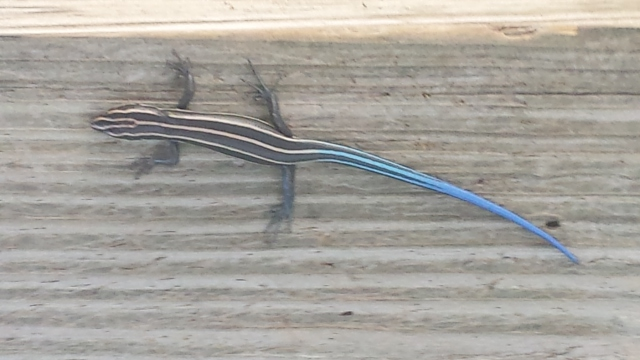 identify lizard please
Question
Waynesboro, tn
could you please tell me
identify lizard please
Question
Waynesboro, tn
could you please tell me
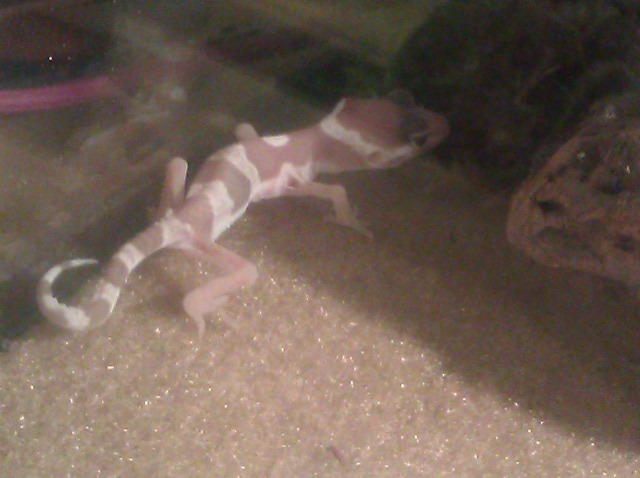 Baby Leo SICK
Question
Leo SICK
I just recently bought a
Baby Leo SICK
Question
Leo SICK
I just recently bought a
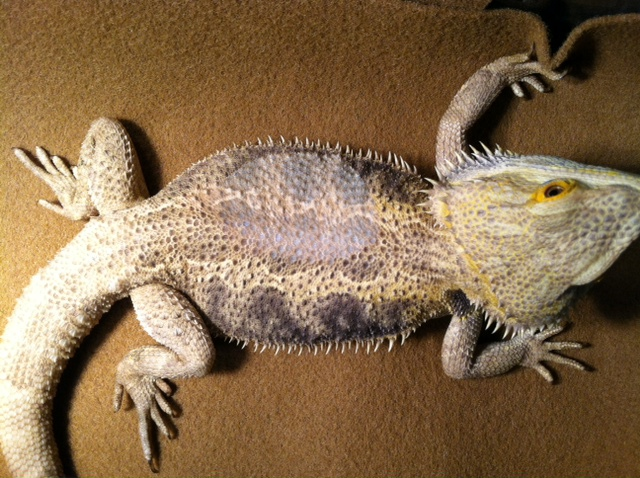 Bearded Dragon skin problem
Question
Bearded Dragon
Something is wrong with
Bearded Dragon skin problem
Question
Bearded Dragon
Something is wrong with
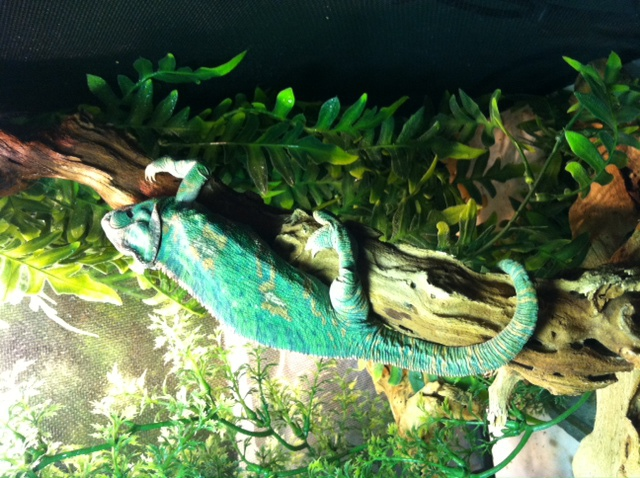 1 year old female veiled chameleon
QuestionLizzy
Lizzys Setup
QUESTION: I ha
1 year old female veiled chameleon
QuestionLizzy
Lizzys Setup
QUESTION: I ha
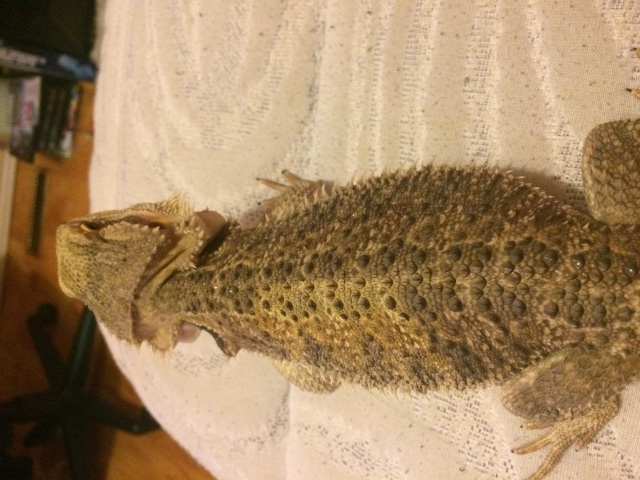 Bearded dragon skin
Question
Luna
My beareded dragon is about a year
Bearded dragon skin
Question
Luna
My beareded dragon is about a year